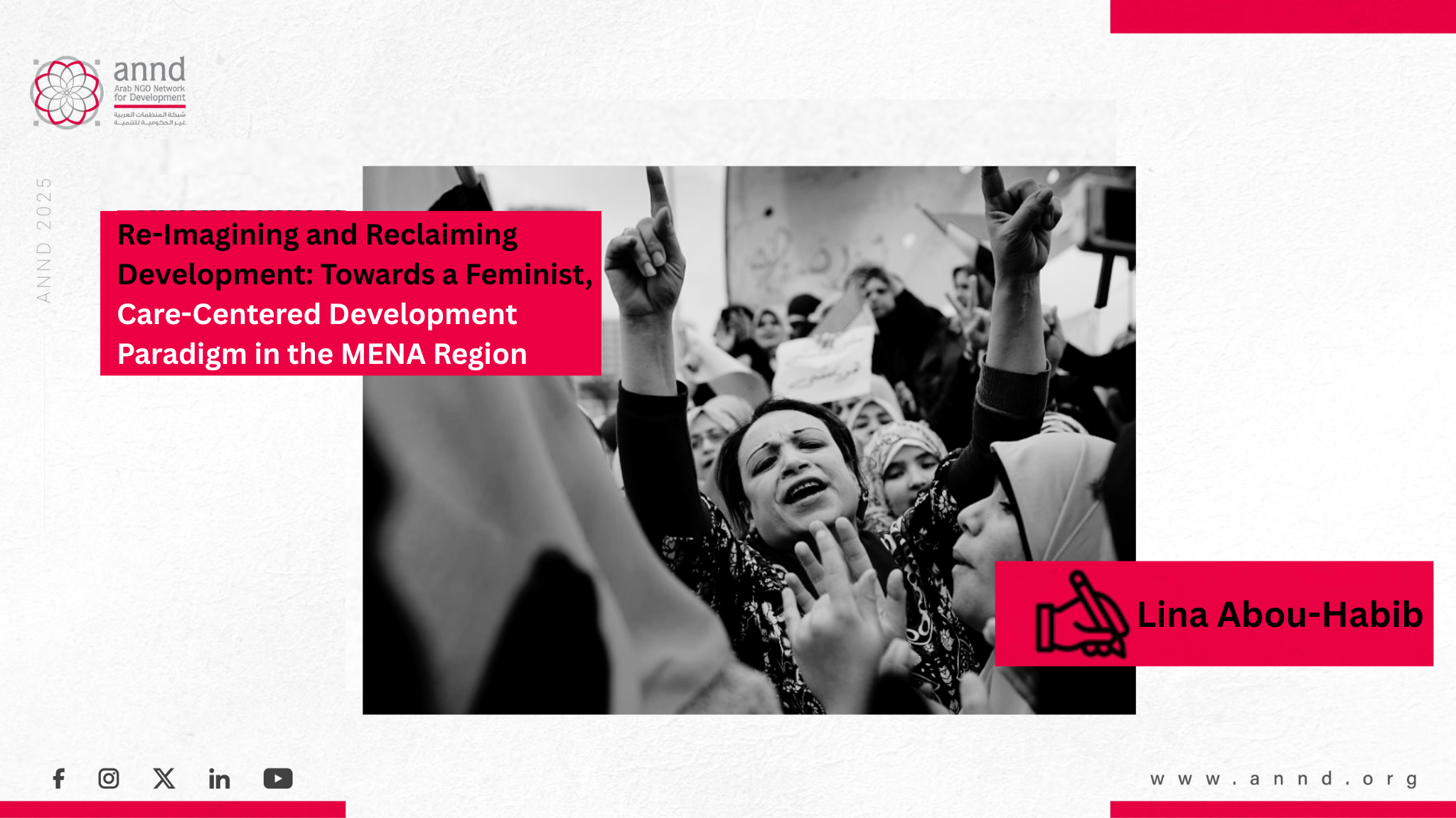
Oct 21, 2025
Re-Imagining and Reclaiming Development: Towards a Feminist, Care-Centered Development Paradigm in the MENA Region - Lina Abou-Habib

Re-Imagining and Reclaiming Development: Towards a Feminist,
Care-Centered Development Paradigm in the MENA Region - Lina Abou-Habib
Thirty years after the 1995 World Summit for Social Development in Copenhagen, the global community gathers in Doha to reassess collective commitments made toward human-centered development. This time frame is very much reminiscent to the UNIVth Conference for Women held in Beijing in 1995 and the global effort to revisit it 30 years later in 2025. In both cases, the hope and optimism of the mid-1990s, when social integration, poverty eradication, and employment were declared the pillars of development, has dwindled as we witness brutal inequalites, environmental collapse, commodification of life and liveihoods, and the evisceration of the social contract. This is the reality that faces us as we approach WSSD + particularly with the gender-blind, conflict-ridden, and neoliberal logic that has shaped the last three decades.
From Copenhagen to Doha: The Mirage of “Inclusive Growth”
The Copenhagen Summit framed social development within a market-friendly paradigm that positioned economic growth as the engine of progress. States in the MENA region as well as the international community adopted the rhetoric of “inclusive growth” and “modernization” while pursuing structural adjustment programs that cut social spending, privatized public goods, and dismantled welfare institutions. Women, migrants, queer folks, and marginalized communities bore the brunt of this transformation.
For instance, im Egypt, Morocco, Jordan, and Tunisia, policies aimed at “empowering women through labor participation” often meant channeling women into precarious, low-wage, and informal sectors including harsh work conditions in garment factories, agricultural work, care and domestic work, all unrecognised, invisible and unprotectedThe MENA region reeks of examples of the ways in which the neoliberal promise of empowerment translated into feminized vulnerability.
The Care Economy: From Invisible Labor to Transformative Framework
Feminist researchers and activists from the region have always maintained that social development cannot be measured by GDP or labor-force participation alone but should clearly centre what constitutes the “care economy”. Indeed, the vast, often invisible network of unpaid and underpaid labor is waht sustains individuals, societies and economies especially when public institutions and services are broken. In Lebanon, women’s unpaid care work expanded dramatically after the financial collapse of 2020, and was critical in sustaining households, schools, and community networks where public institutions and services failed. Similar dynamics unfolded in Palestine, Yemen, and Sudan, and where exacerbated by conflict, genocide, and forced migration.
Recognizing, reducing, and redistributing care work is a structural imperative for any just development paradigm. Public investment in care infrastructure which childcare centers, eldercare systems, community health, and social protection, has to treated as productive, not residual, spending. Latin American countries such as Chile, Colombia, Uruguay and Mexico have begun institutionalizing national care systems while Mexico is hosting the Global Alliance for Care which seeks to bring multi-stakeholders together in an effort to rethink socio-political realities and recognise the intersections of gender, class, displacement, conflict, and informality.
Human Rights, Diversity, and the Limits of the “Social”
Copenhagen’s discourse on “social integration” was couched in the language of cohesion, not justice. This has allowed authoritarian regimes in the MENA region to co-opt development language while restricting civic space, criminalizing dissent, and suppressing women, migrants, and LGBTQ+ rights. The façade of “national unity” has often meant enforced conformity and exclusion of difference.
A rights-based approach to development demands the opposite: recognition of diversity as foundational. Feminist and queer movements in Lebanon, Tunisia, and Morocco have long argued that social development that is disconnected from political freedoms and bodily autonomy reproduces patriarchal and authoritarian hierarchies. True inclusion requires dismantling these hierarchies perpetuated by religious family laws and citizenship regimes as well as economic systems that devalue informal labor and migrant contributions and marginalize women, queer folks, and stateless persons.
Reclaiming the Public: Civil Society and the Feminist Re-imagining of Development
Across the MENA region feminist organisations organizations have pioneered community-based research and knowledge production, care collectives, and rights advocacy in contexts of shrinking civic space and heightened anti-rights movements. Initiatives such as Lebanon’s Stories Behind the Headlines or Tunisia’s women-led cooperatives illustrate how local actors are redefining “social development” through solidarity, not charity. Yet these efforts are systematically undermined by donor conditionalities and the depoliticization of the development discourse.
A feminist critique calls for re-politicizing development through situating it within struggles for redistribution, accountability, and ecological justice. Development must be reclaimed as a democratic, participatory process led by those most affected by inequality and exclusion.
Beyond Neoliberalism: Towards a Feminist Political Economy of Care
The WSSD + 30 in Doha offers an opportunity to articulate a new development compact anchored in care, justice, and human rights. Such a paradigm would entail:
- Re-centering the State as guarantor of social protection and equal citizenship, rather than as facilitator of privatization.
- Embedding care in macroeconomic policy including in budgeting and taxation laws and as a central pillar of economic sustainability.
- Institutionalizing participation by intersectional feminist, labor, and community movements in development governance.
- Protecting diversity and bodily autonomy as core indicators of social well-being.
- Challenging the monetization and commodification of development that subordinates social goals to market imperatives.
